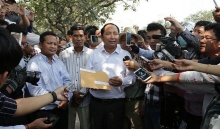Global unions condemn conviction of union leaders in Cambodia

Solidarity statement
The Asia-Pacific Regional Offices of six global union federations – the UNI Global Union (UNI), the Building and Wood Workers’ International (BWI), the International Domestic Workers’ Federation (IDWF), the Public Services International (PSI), IndustriALL, the International Union of Food, Agricultural, Hotel, Restaurant, Catering, Tobacco and Allied Workers Associations (IUF) - strongly condemn the conviction of six prominent independent union leaders by the Phnom Penh Municipal Court on 11 December 2018.
The six union leaders – Ath Thorn, Chea Mony, Yang Sophorn, Pav Sina, Rong Chhun and Mam Nhim – were all found guilty of instigating intentional acts of violence with aggravating circumstances, intentionally causing damage with aggravating circumstances, threats to destroy accompanied by an order and blocking public traffic. All six received two-and-a-halfyear suspended prison sentences and were ordered to pay a collective 35,000,000 riel (approximately $8600 USD) in compensation for two civil parties, one of whom gave testimony during the hearing that he withdrew his claim for compensation.
The charges stemmed from protests along Veng Sreng Boulevard in late 2013, when Cambodian garment and footwear workers took to the streets to demand an increase in the minimum wage to $160 USD per month. At least four people were killed, 28 hospitalised, many with bullet injuries, and one young man disappeared after military police began firing at workers along the Boulevard on 3 January 2014.
All six union leaders had been out on bail since the charges were laid, but no trial was held until 7 December 2018 after Prime Minister Hun Sen ordered the Ministry of Labour and Vocational Training and the Ministry of Justice to end outstanding cases against union leaders by the end of the year. Criminal charges being left outstanding for years at a time is a common occurrence in Cambodia, designed to intimidate independent civil society leaders into silence.
Whilst the sentence does not require those convicted to go to prison, they face imprisonment for these charges if they commit any other felony or misdemeanour within the next five years – a period of time that coincides with the next national elections in 2023. As the criminal charges stem from independent trade union activity, we hold grave fears that these suspended sentences will be used to imprison the convicted if they engage in any protest action over the next five years. In this sense, the decision on 11 December 2018 may be viewed as a ploy by the Royal Government of Cambodia to both appease the international community by bringing the case to an end, whilst maintaining the lingering threat of imprisonment that all six convicted faced before the case was brought to trial.
Originally, all six union leaders had been directly charged with having caused violence and damage to property. The union leaders’ trial was held on those charges. When the court handed down judgment, the charges were changed from the direct charges of committing the acts to charges of instigating those acts. No trial was held regarding these altered charges. Moreover, no notice of the changes to the charges was given to either the accused or their lawyers. The altered charges were only revealed when the court passed judgment.
During the trial, the prosecutor stated that, although there was evidence that violence and damage to property had occurred, there was no evidence to show that the accused had committed such acts. No evidence was submitted to prove that the six union leaders had instigated any of the acts with which they were charged. None of the actual perpetrators of violence or damage were brought to the hearing nor were they named.
We note that Article 351 of the Code of Criminal Procedure states that the facts in a judgment must be clear and beyond reasonable doubt. Article 24 of the Code of Criminal Procedure further states that the purpose of a criminal action is to examine the existence of a criminal offence and to prove the guilt of an offender.
In the absence of any evidence submitted to court, we cannot see how the court has convicted these six union leaders on charges that were not even the subject of the trial.
These convictions are another example of the oppression faced by independent union leaders in Cambodia. These convictions signal that freedom of association and independent trade unionism in Cambodia remains under direct threat. We urge for the reopening of civil society space in order to allow genuine freedom of association for Cambodian people and to ensure that independent trade unions can freely operate in the interests of their members. Moreover, we call for the convictions against these six union leaders to be immediately voided.
Further, we note that these cases are just six amongst many more union leaders and activists that have been targeted simply because they have taken action in pursuit of workers’ rights. We also condemn the ongoing persecution of these individuals and demand that their charges be dropped altogether and compensation be paid.
Finally, it is a cruel irony that there is still no justice for the families and friends of trade union leaders and other civil society activists that have been killed by the Hun Sen regime in the defence of worker and human rights. We stress that justice delayed is justice denied, and that these crimes must not go unpunished.

